Vegan dietary pattern for the primary and secondary prevention of cardiovascular diseases
- PMID: 33629376
- PMCID: PMC8092640
- DOI: 10.1002/14651858.CD013501.pub2
Vegan dietary pattern for the primary and secondary prevention of cardiovascular diseases
Abstract
Background: Diet plays a major role in the aetiology of cardiovascular disease (CVD) and as a modifiable risk factor is the focus of many prevention strategies. Recently vegan diets have gained popularity and there is a need to synthesise existing clinical trial evidence for their potential in CVD prevention.
Objectives: To determine the effectiveness of following a vegan dietary pattern for the primary and secondary prevention of CVD.
Search methods: We searched the following electronic databases on 4 February 2020: the Cochrane Central Register of Controlled Trials (CENTRAL), MEDLINE, Embase and Web of Science Core Collection. We also searched ClinicalTrials.gov in January 2021. We applied no language restrictions.
Selection criteria: We selected randomised controlled trials (RCTs) in healthy adults and adults at high risk of CVD (primary prevention) and those with established CVD (secondary prevention). A vegan dietary pattern excludes meat, fish, eggs, dairy and honey; the intervention could be dietary advice, provision of relevant foods, or both. The comparison group received either no intervention, minimal intervention, or another dietary intervention. Outcomes included clinical events and CVD risk factors. We included only studies with follow-up periods of 12 weeks or more, defined as the intervention period plus post-intervention follow-up.
Data collection and analysis: Two review authors independently assessed studies for inclusion, extracted data and assessed risks of bias. We used GRADE to assess the certainty of the evidence. We conducted three main comparisons: 1. Vegan dietary intervention versus no intervention or minimal intervention for primary prevention; 2. Vegan dietary intervention versus another dietary intervention for primary prevention; 3. Vegan dietary intervention versus another dietary intervention for secondary prevention.
Main results: Thirteen RCTs (38 papers, 7 trial registrations) and eight ongoing trials met our inclusion criteria. Most trials contributed to primary prevention: comparisons 1 (four trials, 466 participants randomised) and comparison 2 (eight trials, 409 participants randomised). We included only one secondary prevention trial for comparison 3 (63 participants randomised). None of the trials reported on clinical endpoints. Other primary outcomes included lipid levels and blood pressure. For comparison 1 there was moderate-certainty evidence from four trials with 449 participants that a vegan diet probably led to a small reduction in total cholesterol (mean difference (MD) -0.24 mmol/L, 95% confidence interval (CI) -0.36 to -0.12) and low-density lipoprotein (LDL) cholesterol (MD -0.22 mmol/L, 95% CI -0.32 to -0.11), a very small decrease in high-density lipoprotein (HDL) levels (MD -0.08 mmol/L, 95% CI -0.11 to -0.04) and a very small increase in triglyceride levels (MD 0.11 mmol/L, 95% CI 0.01 to 0.21). The very small changes in HDL and triglyceride levels are in the opposite direction to that expected. There was a lack of evidence for an effect with the vegan dietary intervention on systolic blood pressure (MD 0.94 mmHg, 95% CI -1.18 to 3.06; 3 trials, 374 participants) and diastolic blood pressure (MD -0.27 mmHg, 95% CI -1.67 to 1.12; 3 trials, 372 participants) (low-certainty evidence). For comparison 2 there was a lack of evidence for an effect of the vegan dietary intervention on total cholesterol levels (MD -0.04 mmol/L, 95% CI -0.28 to 0.20; 4 trials, 163 participants; low-certainty evidence). There was probably little or no effect of the vegan dietary intervention on LDL (MD -0.05 mmol/L, 95% CI -0.21 to 0.11; 4 trials, 244 participants) or HDL cholesterol levels (MD -0.01 mmol/L, 95% CI -0.08 to 0.05; 5 trials, 256 participants) or triglycerides (MD 0.21 mmol/L, 95% CI -0.07 to 0.49; 5 trials, 256 participants) compared to other dietary interventions (moderate-certainty evidence). We are very uncertain about any effect of the vegan dietary intervention on systolic blood pressure (MD 0.02 mmHg, 95% CI -3.59 to 3.62) or diastolic blood pressure (MD 0.63 mmHg, 95% CI -1.54 to 2.80; 5 trials, 247 participants (very low-certainty evidence)). Only one trial (63 participants) contributed to comparison 3, where there was a lack of evidence for an effect of the vegan dietary intervention on lipid levels or blood pressure compared to other dietary interventions (low- or very low-certainty evidence). Four trials reported on adverse events, which were absent or minor.
Authors' conclusions: Studies were generally small with few participants contributing to each comparison group. None of the included studies report on CVD clinical events. There is currently insufficient information to draw conclusions about the effects of vegan dietary interventions on CVD risk factors. The eight ongoing studies identified will add to the evidence base, with all eight reporting on primary prevention. There is a paucity of evidence for secondary prevention.
Copyright © 2021 The Cochrane Collaboration. Published by John Wiley & Sons, Ltd.
Conflict of interest statement
KR: none known
LA‐K: none known
AT: none known
SS: none known
Figures
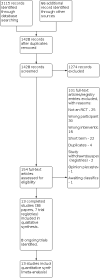

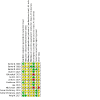





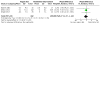

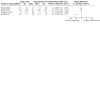




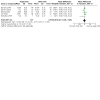
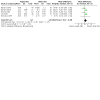
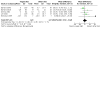
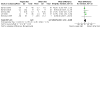


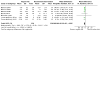









Update of
- doi: 10.1002/14651858.CD013501
References
References to studies included in this review
Barnard 2004 {published data only}
-
- Barnard N, Scialli A, Turner-Mcgrievy G, Lanou A. Acceptability of a low-fat, vegan diet compares favorably to a step II diet in a randomized, controlled trial. Diabetes 2003;52:A556. - PubMed
-
- Barnard ND, Scialli AR, Turner-McGrievy G, Lanou AJ, Glass J. The effects of a low-fat, plant-based dietary intervention on body weight, metabolism, and insulin sensitivity. American Journal of Medicine 2005;118(9):991-7. - PubMed
-
- Barnard ND, Scialli AR, Turner-McGrievy G, Lanou AJ. Acceptability of a low-fat vegan diet compares favorably to a step II diet in a randomized, controlled trial. Journal of Cardiopulmonary Rehabilitation and Prevention 2004;24(4):229-35. - PubMed
-
- Turner-McGrievy GM, Barnard ND, Scialli AR, Lanou AJ. Effects of a low-fat vegan diet and a Step II diet on macro- and micronutrient intakes in overweight postmenopausal women. Nutrition 2004;20(9):738-46. - PubMed
-
- Turner-McGrievy GM, Barnard ND, Scialli AR. A two-year randomized weight loss trial comparing a vegan diet to a more moderate low-fat diet. Obesity (Silver Spring) 2007;15(9):2276-81. - PubMed
Barnard 2009 {published data only}
-
- Barnard N, Cohen J, Jenkins DJ, Turner-McGrievy G, Ferdowsian H. Randomized clinical trial of a plant-based diet for glycemic, lipid, and weight control in type 2 diabetes: follow-up results. Diabetes 2007;56:A448.
-
- Barnard N, Cohen J, Jenkins DJ, Turner-McGrievy G. Effect of a plant-based diet on glycemic control and cardiovascular risk factors in individuals with type 2 diabetes: a randomized clinical trial. Diabetes 2006;55:A8. - PubMed
-
- Barnard ND, Cohen J, Jenkins DJ, Turner-McGrievy G, Gloede L, Jaster B, et al. A low-fat vegan diet improves glycemic control and cardiovascular risk factors in a randomized clinical trial in individuals with type 2 diabetes. Diabetes Care 2006;29(8):1777-83. - PubMed
-
- Barnard ND, Gloede L, Cohen J, Jenkins DJ, Turner-McGrievy G, Green AA, et al. A low-fat vegan diet elicits greater macronutrient changes, but is comparable in adherence and acceptability, compared with a more conventional diabetes diet among individuals with type 2 diabetes. Journal of the American Dietetic Association 2009;109(2):263-72. - PMC - PubMed
Barnard 2018 {published data only}
-
- Barnard ND, Levin SM, Gloede L, Flores R. Turning the waiting room into a classroom: weekly classes using a vegan or a portion-controlled eating plan improve diabetes control in a randomized translational study. Journal of the Academy of Nutrition and Dietetics 2018;118(6):1072-9. - PubMed
-
- Barnard ND, Levin SM, Gloede L, Flores RA. Turning the waiting room into a classroom: weekly classes using a vegan or a portion-controlled eating plan improve diabetes control in randomized translational study. Erratum table for: Journal of the Academy of Nutrition and Dietetics. 2018; 118:1072. Journal of the Academy of Nutrition and Dietetics 2019;119(8):1391-3. - PubMed
-
- NCT01222429. Practice based nutrition intervention. clinicaltrials.gov/show/NCT01222429 (first received 18 October 2010).
Bunner 2015 {published data only}
-
- Bunner AE, Gonzalez J, Agarwal U, Valente F, Barnard ND. Nutrition intervention for diabetic neuropathy. Diabetes 2014;63(Suppl 1):A578.
-
- NCT01690962. A nutritional intervention for diabetic neuropathy. clinicaltrials.gov/show/NCT01690962 (first received 24 September 2012).
-
- NCT01953757. A nutritional intervention for diabetic neuropathy (WCCR-DN2). ClinicalTrials.gov/show/NCT01953757 (first received 1 October 2013).
Elkoustaf 2019 {published data only}
-
- Elkoustaf RA, Aldaas OM, Batiste CD, Mercer A, Robinson M, Newton D, et al. Lifestyle interventions and carotid plaque burden: a comparative analysis of two lifestyle intervention programs in patients with coronary artery disease. Permanente Journal 2019;23(18):196. [DOI: 10.7812/TPP/18.196] - DOI - PMC - PubMed
-
- Elkoustaf RA, Ismail M, Batiste C, Mercer A, Aldaas O, Newton D, et al. Diet and ischemic burden: a comparative analysis of a plant based regimen versus a mediterranean regimen in patients with coronary artery disease. Journal of the American College of Cardiology 2017;69(11 Suppl 1):48.
GEICO 2013 {published data only}
-
- Agarwal U, Mishra S, Barnard ND, Xu J, Levin S, Gonzales J, et al. A plant-based diet reduces depression and anxiety and improves work productivity: the GEICO multicenter trial. Diabetes 2013;62:A195.
-
- Agarwal U, Mishra S, Xu J, Levin S, Gonzales J, Barnard ND. A multicenter randomized controlled trial of a nutrition intervention program in a multiethnic adult population in the corporate setting reduces depression and anxiety and improves quality of life: the GEICO study. American Journal of Health Promotion 2015;29(4):245-54. - PubMed
-
- Mishra S, Barnard ND, Xu J, Trap C. A plant-based diet reduces body weight and cardiovascular risk: the GEICO multicenter trial. Diabetes 2012;61(Suppl 1):A192.
Jenkins 2014 {published data only}
-
- Jenkins DJ, Wong JM, Kendall CW, Esfahani A, Ng VW, Leong TC, et al. The effect of a plant-based low-carbohydrate ("Eco-Atkins") diet on body weight and blood lipid concentrations in hyperlipidemic subjects. Archives of Internal Medicine 2009;169(11):1046-54. - PubMed
Kahleova 2018 {published data only}
-
- Kahleova H, Hlozkova A, Fleeman R, Fletcher K, Holubkov R, Barnard ND. Fat quantity and quality, as part of a low-fat, vegan diet, are associated with changes in body composition, insulin resistance, and insulin secretion. A 16-week randomized controlled trial. Nutrients 2019;11(3):13. - PMC - PubMed
-
- Kahleova H, Rembert E, Alwarith J, Yonas W, Tura A, Holubkov R, et al. Changes in gut microbiota in response to a plant-based diet are related to changes in weight, body composition and insulin sensitivity: a 16-week randomised clinical trial. Diabetologia 2019;62:S336.
Lee 2016 {published data only}
Nicholson 1999 {published data only}
-
- Nicholson AS, Sklar M, Barnard ND, Gore S, Sullivan R, Browning S. Toward improved management of NIDDM: a randomized, controlled, pilot intervention using a low fat, vegetarian diet. Preventive Medicine 1999;29(2):87-91. - PubMed
Turner‐McGrievy 2014 {published and unpublished data}
-
- NCT01509066. Healthy eating for reproductive health (HERHealth). clinicaltrials.gov/show/NCT01509066 (first received 12 January 2012).
-
- Turner-McGrievy GM, Davidson CR, Wingard EE, Billings DL. Low glycemic index vegan or low-calorie weight loss diets for women with polycystic ovary syndrome: a randomized controlled feasibility study. Nutrition Research 2014;34(6):552-8. - PubMed
Turner‐McGrievy 2015 {published and unpublished data}
-
- Moore WJ, McGrievy ME, Turner-McGrievy GM. Dietary adherence and acceptability of five different diets, including vegan and vegetarian diets, for weight loss: the New DIETs study. Eating Behaviors 2015;19:33-8. - PubMed
-
- NCT01742572. New DIETs: new dietary interventions enhancing the treatment for weight loss. clinicaltrials.gov/show/NCT01742572 (first received 5 December 2012).
-
- Turner-McGrievy GM, Davidson CR, Wingard EE, Wilcox S, Frongillo EA. Comparative effectiveness of plant-based diets for weight loss: a randomized controlled trial of five different diets. Nutrition 2015;31(2):350-8. - PubMed
References to studies excluded from this review
Agren 2001 {published data only}
-
- Agren JJ, Tvrzicka E, Nenonen MT, Helve T, Hanninen O. Divergent changes in serum sterols during a strict uncooked vegan diet in patients with rheumatoid arthritis. British Journal of Nutrition 2001;85(2):137-9. - PubMed
EVADE‐CAD 2018 {published data only}
Frattaroli 2008 {published data only}
-
- Frattaroli J, Weidner G, Dnistrian AM, Kemp C, Daubenmier JJ, Marlin RO, et al. Clinical events in prostate cancer lifestyle trial: results from two years of follow-up. Urology 2008;72(6):1319-23. - PubMed
Nenonen 1998 {published data only}
-
- Nenonen MT, Helve TA, Rauma AL, Hanninen OO. Uncooked, lactobacilli-rich, vegan food and rheumatoid arthritis. British Journal of Rheumatology 1998;37(3):274-81. - PubMed
Yadav 2016 {published data only}
-
- Yadav V, Marracci G, Kim E, Spain R, Cameron M, Overs S, et al. Low-fat, plant-based diet in multiple sclerosis: a randomized controlled trial. Multiple Sclerosis and Related Disorders 2016;9:80-90. - PubMed
References to studies awaiting assessment
NCT00324545 {published data only}
-
- NCT00324545. Cardiovascular outcomes of diet counseling. clinicaltrials.gov/show/NCT00324545 (received 11 May 2006).
References to ongoing studies
ACTRN12617000541303 {published data only}
-
- ACTRN12617000541303. The EDGe (End Diabetes Gisborne) trial. Using the whole-foods, plant-based diet in a community programme for people with obesity and diabetes. whoint/trialsearch/Trial2aspx?TrialID=ACTRN12617000541303 2017.
CTRI/2018/10/015896 {published data only}
-
- CTR1/2018/10/015896. The effect of different types of diet on the body weight and glycemic control of diabetics. whoint/trialsearch/Trial2aspx?TrialID=CTRI/2018/10/015896 2018.
NCT03698955 {published data only}
-
- NCT03698955. Low-fat vegan diet versus a Mediterranean diet on body weight. clinicaltrials.gov/show/NCT03698955 (first received 9 October 2018).
NCT03901183 {published data only}
-
- NCT03901183. Plant-based nutrition for patients with cardiovascular risk factors. clinicaltrials.gov/show/NCT03901183 (first received 3 April 2019).
NCT04088981 {published data only}
-
- NCT04088981. Effect of a dietary intervention on intracellular lipid, insulin sensitivity, and glycemic control in type 2 diabetes. clinicaltrials.gov/show/NCT04088981 (first received 13 September 2019).
NCT04222894 {published data only}
-
- NCT04222894. Hospital workplace nutrition study. clinicaltrials.gov/show/NCT04222894 (first received 10 January 2020).
NCT04587154 {published data only}
-
- NCT04587154. Womens study to alleviate vasomotor symptoms (WAVS). clinicaltrials.gov/show/NCT04587154 (first received 14 October 2020).
Turner‐McGrievy 2020 {published data only}
-
- Turner-McGrievy G, Wilcox S, Frongillo EA, Murphy A, Hutto B, Williams K, et al. The Nutritious Eating with Soul (NEW Soul) Study: study design and methods of a two-year randomized trial comparing culturally adapted soul food vegan vs. omnivorous diets among African American adults at risk for heart disease. Contemporary Clinical Trials 2020;88:105897. - PMC - PubMed
Additional references
Allès 2017
Appleby 2016
Benatar 2018
Dinu 2017
Egger 1997
European Heart Network 2017
-
- European Heart Network. European Cardiovascular Disease Statistics 2017 edition. ehnheart.org/cvd-statistics.
Global Atlas on CVD Prevention and Control
-
- Global Atlas on Cardiovascular Disease Prevention and Control. World Health Organisation, Geneva 2011.
Google Trends
-
- Google. Veganism. trends.google.com (accessed 23 May 2019).
GRADEpro GDT 2015 [Computer program]
-
- GRADEpro GDT. Hamilton (ON): McMaster University (developed by Evidence Prime), 2015. Available at gradepro.org.
Higgins 2011
-
- Higgins JP, Green S (editors). Cochrane Handbook for Systematic Reviews of Interventions Version 5.1 (updated March 2011). The Cochrane Collaboration, 2011. Available from training.cochrane.org/handbook/archive/v5.1/.
Higgins 2020
-
- Higgins JP, Li T, Deeks JJ (editors). Chapter 6: Choosing effect measures and computing estimates of effect. In: Higgins JP, Thomas J, Chandler J, Cumpston M, Li T, Page MJ, et al (editors). Cochrane Handbook for Systematic Reviews of Interventions version 6.1 (updated September 2020). The Cochrane Collaboration, 2019. Available from www.training.cochrane.org/handbook.
Jensen 2014
-
- Jensen MD, Ryan DH, Donato KA, Apovian CM, Ard JD, Comuzzie AG, et al. AHA/ACC/TOS guideline for the management of overweight and obesity in adults: a report of the American College of Cardiology/American Heart Association Task Force on Practice Guidelines and The Obesity Society. Circulation 2014;129(25 Suppl 2):S102-38. [DOI: 10.1161/01.cir.0000437739.71477] - DOI - PMC - PubMed
Lefebvre 2020
-
- Lefebvre C, Glanville J, Briscoe S, Littlewood A, Marshall C, Metzendorf M-I, et al. Technical Supplement to Chapter 4: Searching for and selecting studies. In: Higgins JP, Thomas J, Chandler J, Cumpston MS, Li T, Page MJ, et al (editors). Cochrane Handbook for Systematic Reviews of Interventions Version 6.1 (updated September 2020). The Cochrane Collaboration, 2020. Available from: www.training.cochrane.org/handbook.
Liberati 2009
Lopez 2019
-
- Lopez PD, Cativo EH, Atlas SA, Rosendorff C. The effect of vegan diets on blood pressure in adults: a meta-analysis of randomized controlled trials. American Journal of Medicine 2019;132(7):875. [DOI: ] - PubMed
O’Donnell 2010
-
- O’Donnell MJ, Xavier D, Liu L, Zhang H, Chin SL, Rao-Melacini P, et al. Risk factors for ischaemic and intracerebral haemorrhagic stroke in 22 countries (the INTERSTROKE study): a case-control study. Lancet 2010;376(9735):112-23. - PubMed
Review Manager 2014 [Computer program]
-
- Review Manager 5 (RevMan 5). Version 5.4. Copenhagen: Nordic Cochrane Centre, The Cochrane Collaboration, 2014.
Schünemann 2017
-
- Schünemann HJ, Oxman AD, Vist GE, Higgins JP, Deeks JJ, Glasziou P, at al. Chapter 12: Interpreting results and drawing conclusions. In: Higgins JP, Churchill R, Chandler J, Cumpston MS, et al (editors). Cochrane Handbook for Systematic Reviews of Interventions version 5.2.0 (updated June 2017). Available from www.training.cochrane.org/handbook.
Shah 2018
-
- Shah B, Newman JD, Woolf K, Ganguzza L, Guo Y, Allen N, et al. Anti-inflammatory effects of a vegan diet versus the American Heart Association–recommended diet in coronary artery disease trial. Journal of the American Heart Association 2018;7:e011367. [DOI: 10.1161/JAHA.118.011367] - DOI - PMC - PubMed
Springmann 2016
Tennant 2007
Tomova 2019
Toumpanakis 2018
Vegan Society ‐ definition
-
- The Vegan Society. Definition of veganism. www.vegansociety.com/go-vegan/definition-veganism (accessed 22 May 2019).
Vegan Society ‐ statistics
-
- The Vegan Society. Statistics. www.vegansociety.com/news/media/statistics, Sources: Ipsos Mori surveys, commissioned by The Vegan Society, 2016 and 2019, and The Food & You surveys, organised by the Food Standards Agency (FSA) and the National Centre for Social Science Research (Natcen). (accessed 13 January 2021).
Ware 1992
-
- Ware JE Jr, Sherbourne CD. The MOS 36-item short-form health survey (SF-36). I. Conceptual framework and item selection. Medical Care 1992;30(6):473-83. - PubMed
WHO 2003
-
- World Health Organization Study Group Diet, Nutrition and the Prevention of Chronic Diseases. WHO Technical Report Series 916. Geneva: WHO, 2003. - PubMed
WHO 2017
-
- World Health Organization. Cardiovascular diseases (CVDs). www.who.int/news-room/fact-sheets/detail/cardiovascular-diseases-(cvds) (accessed 6 June 2019).
Willett 2019
-
- Willett W, Rockström J, Loken B, Springmann M, Lang T, Vermeulen S, et al. Food in the anthropocene: the EAT–Lancet Commission on healthy diets from sustainable food systems. Lancet 2019;393(10170):447–92. - PubMed
Wing 2011
Yusuf 2004
-
- Yusuf S, Hawken S, Ounpuu S, Dans T, Avezum A, Lanas F, et al. Effect of potentially modifiable risk factors associated with myocardial infarction in 52 countries (the INTERHEART study): case-control study. Lancet 2004;364(9438):937-52. - PubMed
References to other published versions of this review
Publication types
MeSH terms
Substances
LinkOut - more resources
Full Text Sources
Other Literature Sources
Miscellaneous

